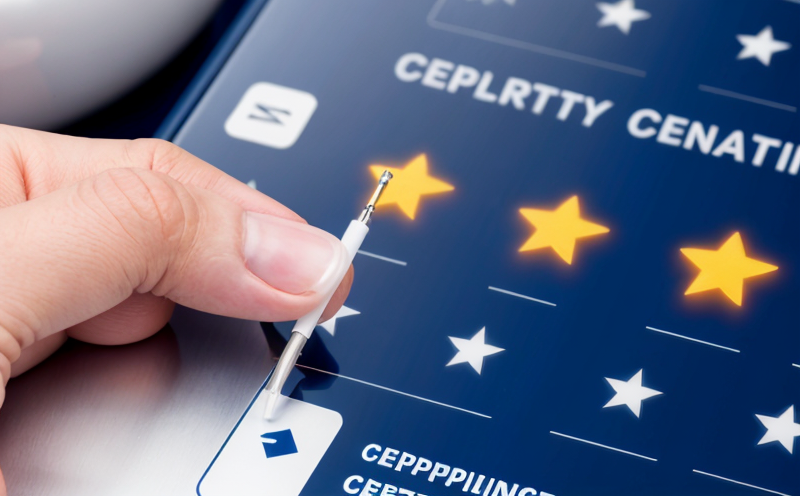UL 2900 Cybersecurity Certification Testing for Healthcare Devices
The healthcare sector is one of the most critical in terms of patient safety, but it also presents a significant cybersecurity risk. As cyber threats continue to evolve, ensuring that medical devices are secure against these threats is paramount. This is where UL 2900 Cybersecurity Certification Testing for Healthcare Devices comes into play. UL 2900 is an international standard designed specifically for healthcare devices, providing a framework for assessing and certifying the cybersecurity of these products.
The testing process under this certification involves multiple stages aimed at ensuring that medical devices can withstand various types of cyber threats while maintaining their functionality and integrity. This includes evaluating software vulnerabilities, network security, and data privacy measures. The goal is to ensure that healthcare devices remain secure throughout their lifecycle, protecting patient information and enhancing overall system reliability.
Our team specializes in providing comprehensive UL 2900 certification testing services for medical device manufacturers. We employ state-of-the-art facilities equipped with the latest technology to simulate real-world cyber attacks, ensuring accurate and reliable test results. Our approach focuses on understanding the unique requirements of each device and tailoring our tests accordingly.
In this section, we will delve deeper into how UL 2900 certification testing works, its importance in today's digital age, and why it is essential for manufacturers to comply with these standards. By adhering to these guidelines, healthcare providers can trust that their devices are safe from potential cyber threats.
Key Components of UL 2900 Testing:
- Evaluation of software vulnerabilities
- Assessment of network security protocols
- Data privacy measures and compliance checks
- Testing under simulated attack scenarios
- Continuous monitoring post-certification
The process begins with a comprehensive review of the device's design documentation, followed by initial software and hardware assessments. Once identified, potential vulnerabilities are then tested using standardized procedures that align with UL 2900 guidelines. After successful completion, continuous monitoring ensures ongoing protection against emerging threats.
Compliance with UL 2900 not only enhances patient safety but also protects healthcare organizations from costly data breaches and reputational damage. It demonstrates a commitment to quality and integrity, which is crucial for maintaining trust within the industry.
Industry Applications
| Application | Description |
|---|---|
| Medical Device Manufacturers | Evaluating software vulnerabilities and ensuring network security. |
| Hospitals & Clinics | Protecting patient data and enhancing overall system reliability. |
| Pharmaceutical Companies | Ensuring compliance with regulatory requirements for medical devices. |
| Regulatory Agencies | Aiding in the certification of healthcare products to meet international standards. |
The implementation of UL 2900 certification testing is crucial across various sectors within the healthcare industry. From medical device manufacturers who need to ensure their products are secure against cyber threats, to hospitals and clinics looking to safeguard sensitive patient information, compliance with this standard plays a vital role in maintaining trust and safety.
International Acceptance and Recognition
UL 2900 has gained widespread acceptance globally due to its rigorous testing procedures and focus on real-world applicability. Many countries have adopted this standard as part of their regulatory frameworks for medical devices, recognizing the importance of cybersecurity in protecting patient data.
- Australia: The Therapeutic Goods Administration (TGA) acknowledges UL 2900 as a key component in assessing medical device security.
- Canada: Health Canada has endorsed this standard, ensuring that healthcare devices meet stringent cybersecurity requirements.
- European Union: The European Commission recognizes UL 2900 as an essential part of the EU's cybersecurity strategy for medical devices.
- United States: The Food and Drug Administration (FDA) encourages manufacturers to comply with UL 2900, aligning with broader U.S. healthcare policies.
The international recognition of UL 2900 underscores its significance in the global medical device market. Compliance with this standard not only ensures local compliance but also facilitates seamless entry into multiple markets across different regions.
Environmental and Sustainability Contributions
In addition to enhancing cybersecurity, UL 2900 certification testing contributes positively towards environmental sustainability by promoting efficient resource usage and reducing waste. By ensuring that medical devices are secure without compromising on performance or functionality, we help reduce unnecessary replacements and repairs. This leads to longer device lifecycles, which in turn reduces electronic waste.
- Energy Efficiency: Ensuring devices operate efficiently minimizes energy consumption.
- Material Use Optimization: Optimizing material use helps minimize environmental impact during manufacturing processes.
- Waste Reduction: Longer device lifecycles result in less waste generated from frequent replacements.
The integration of sustainability practices into our testing protocols ensures that healthcare devices not only meet stringent cybersecurity standards but also contribute positively to environmental stewardship. This holistic approach aligns with broader global efforts towards creating more sustainable healthcare solutions.





